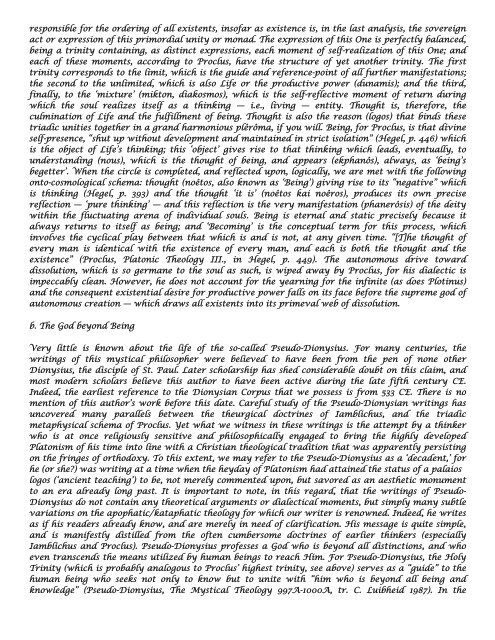Neo-Platonism - Grand Lodge Bet-El
Neo-Platonism - Grand Lodge Bet-El
Neo-Platonism - Grand Lodge Bet-El
Create successful ePaper yourself
Turn your PDF publications into a flip-book with our unique Google optimized e-Paper software.
esponsible for the ordering of all existents, insofar as existence is, in the last analysis, the sovereign<br />
act or expression of this primordial unity or monad. The expression of this One is perfectly balanced,<br />
being a trinity containing, as distinct expressions, each moment of self-realization of this One; and<br />
each of these moments, according to Proclus, have the structure of yet another trinity. The first<br />
trinity corresponds to the limit, which is the guide and reference-point of all further manifestations;<br />
the second to the unlimited, which is also Life or the productive power (dunamis); and the third,<br />
finally, to the ‘mixture’ (mikton, diakosmos), which is the self-reflective moment of return during<br />
which the soul realizes itself as a thinking — i.e., living — entity. Thought is, therefore, the<br />
culmination of Life and the fulfillment of being. Thought is also the reason (logos) that binds these<br />
triadic unities together in a grand harmonious plêrôma, if you will. Being, for Proclus, is that divine<br />
self-presence, “shut up without development and maintained in strict isolation” (Hegel, p. 446) which<br />
is the object of Life’s thinking; this ‘object’ gives rise to that thinking which leads, eventually, to<br />
understanding (nous), which is the thought of being, and appears (ekphanôs), always, as ‘being’s<br />
begetter’. When the circle is completed, and reflected upon, logically, we are met with the following<br />
onto-cosmological schema: thought (noêtos, also known as ‘Being’) giving rise to its “negative” which<br />
is thinking (Hegel, p. 393) and the thought ‘it is’ (noêtos kai noêros), produces its own precise<br />
reflection — ‘pure thinking’ — and this reflection is the very manifestation (phanerôsis) of the deity<br />
within the fluctuating arena of individual souls. Being is eternal and static precisely because it<br />
always returns to itself as being; and ‘Becoming’ is the conceptual term for this process, which<br />
involves the cyclical play between that which is and is not, at any given time. “[T]he thought of<br />
every man is identical with the existence of every man, and each is both the thought and the<br />
existence” (Proclus, Platonic Theology III., in Hegel, p. 449). The autonomous drive toward<br />
dissolution, which is so germane to the soul as such, is wiped away by Proclus, for his dialectic is<br />
impeccably clean. However, he does not account for the yearning for the infinite (as does Plotinus)<br />
and the consequent existential desire for productive power falls on its face before the supreme god of<br />
autonomous creation — which draws all existents into its primeval web of dissolution.<br />
b. The God beyond Being<br />
Very little is known about the life of the so-called Pseudo-Dionysius. For many centuries, the<br />
writings of this mystical philosopher were believed to have been from the pen of none other<br />
Dionysius, the disciple of St. Paul. Later scholarship has shed considerable doubt on this claim, and<br />
most modern scholars believe this author to have been active during the late fifth century CE.<br />
Indeed, the earliest reference to the Dionysian Corpus that we possess is from 533 CE. There is no<br />
mention of this author’s work before this date. Careful study of the Pseudo-Dionysian writings has<br />
uncovered many parallels between the theurgical doctrines of Iamblichus, and the triadic<br />
metaphysical schema of Proclus. Yet what we witness in these writings is the attempt by a thinker<br />
who is at once religiously sensitive and philosophically engaged to bring the highly developed<br />
<strong>Platonism</strong> of his time into line with a Christian theological tradition that was apparently persisting<br />
on the fringes of orthodoxy. To this extent, we may refer to the Pseudo-Dionysius as a ‘decadent,’ for<br />
he (or she?) was writing at a time when the heyday of <strong>Platonism</strong> had attained the status of a palaios<br />
logos (‘ancient teaching’) to be, not merely commented upon, but savored as an aesthetic monument<br />
to an era already long past. It is important to note, in this regard, that the writings of Pseudo-<br />
Dionysius do not contain any theoretical arguments or dialectical moments, but simply many subtle<br />
variations on the apophatic/kataphatic theology for which our writer is renowned. Indeed, he writes<br />
as if his readers already know, and are merely in need of clarification. His message is quite simple,<br />
and is manifestly distilled from the often cumbersome doctrines of earlier thinkers (especially<br />
Iamblichus and Proclus). Pseudo-Dionysius professes a God who is beyond all distinctions, and who<br />
even transcends the means utilized by human beings to reach Him. For Pseudo-Dionysius, the Holy<br />
Trinity (which is probably analogous to Proclus’ highest trinity, see above) serves as a “guide” to the<br />
human being who seeks not only to know but to unite with “him who is beyond all being and<br />
knowledge” (Pseudo-Dionysius, The Mystical Theology 997A-1000A, tr. C. Luibheid 1987). In the
















